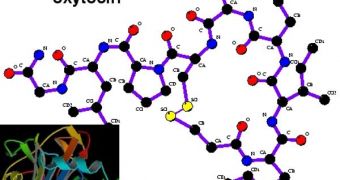Scientists at the University of Haifa, in Israel, have recently determined that the hormone that has been primarily been associated with love – oxytocin – also plays an important part in bolstering negative states of mind. In other words, the chemical is able to make people feel empathy, trust, and generosity, but can also trigger adverse feelings such as jealousy and gloating. The person's state of mind at the time seems to be the only thing that determines whether oxytocin will act positively or negatively.
“Subsequent to these findings, we assume that the hormone is an overall trigger for social sentiments: when the person's association is positive, oxytocin bolsters pro-social behaviors; when the association is negative, the hormone increases negative sentiments,” UH expert Simone Shamay-Tsoory, who was the leader of the new research. Details of the recent scientific investigation were published in the latest issue of the respected scientific journal Biological Psychiatry, AlphaGalileo reports.
The investigation comes on the heels of different studies, which have shown the positive effects that the hormone has on positive states of mind and behaviors. In natural instances, the chemical is released in larger quantities when women go through childbirth, or during intercourse. In the new study, which involved 56 participants, some of them were made to inhale a chemical containing oxytocin, and all of them became more altruistic to each other. Therefore, the team hypothesizes, it may be that, evolutionarily speaking, the chemical plays a crucial role in helping us get more friends.
“Following the earlier results of experiments with oxytocin, we began to examine the possible use of the hormone as a medication for various disorders, such as autism. The results of the present study show that the hormone's undesirable effects on behavior must be examined before moving ahead,” Shamay-Tsoory adds of the research. She adds that other batches of studies demonstrated that aggressive rats that were given oxytocin became even more so, suggesting new obstacles in the path of using the chemical to do good.

 14 DAY TRIAL //
14 DAY TRIAL //